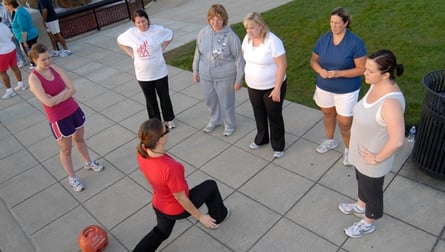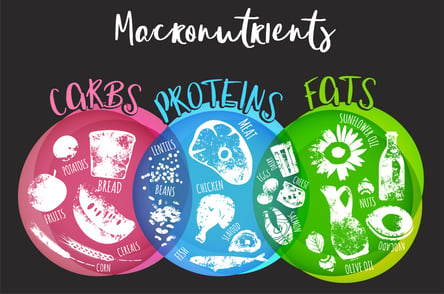 There’s always an assumption that fitness professionals work out 2 hours a day, 7 days a week. They eat healthy all day long and never have any junk food. Basically people think that we are perfect and never make mistakes. I have been in the health and fitness industry for more than 10 years now and I can honestly say that couldn’t be further from the truth.
There’s always an assumption that fitness professionals work out 2 hours a day, 7 days a week. They eat healthy all day long and never have any junk food. Basically people think that we are perfect and never make mistakes. I have been in the health and fitness industry for more than 10 years now and I can honestly say that couldn’t be further from the truth.
Now, before anyone thinks I’m ratting out other trainers or telling you all we don’t practice what we preach, let me explain.
We Are Actually Humans, Too!
I know it’s hard to believe, but we are human; we make mistakes, we have cheat days, we indulge a little, and we even skip workouts from time to time.
Take a look at a conversation I had with one of our trainers at NIFS:
Ashley: How often do you work out?
Lauren: About 5 days a week.
Ashley: How long do you work out for?
Lauren: Anywhere from 30 to 90 minutes. If it’s conditioning, it’s much less.
Ashley: Do you have cheat days? Exercise or nutrition?
Lauren: I try to have cheat meals or situations. I try not to have it be the whole day. In the past, I would have cheat days, but they would turn into a stream of days. So I basically try to allow myself to have something sweet occasionally, so that I don’t fall way off the rail. And there are days where I fail at that, but that’s the goal.
We Aren’t Perfect in the Kitchen
I know this might come as a shock to some of you, but the truth of the matter is, we aren’t perfect when we eat, either. As if the world and our lives aren’t filled with striving for perfection as it is, why would we want to make the kitchen another stressful place?
I say all that to tell you this: it’s okay if you have a little extra of something one day. It’s okay if you have that piece of cake when you are celebrating yourself or someone special. It’s okay to have a “cheat meal.” It’s okay to NOT BE PERFECT.
If it happens, don’t beat yourself up about it. Be aware of it; Learn from it; and move on! The next snack, meal, and day will be better because you came out of the previous situation aware and stronger.
Tips for Staying on Track
Consider the following tips to help you take it easy on yourself, but also keep yourself motivated to stay on track.
Use a Planner
If you are someone who needs to stick to a schedule, plan it out. Write down your meals for the week, plan your schedule around when you can work out, and write down the day and time you will be able to work out. Keep on a schedule!
Provide Rationale
Understanding your “WHY” should be your biggest motivator. I encourage you to write down your reasons why you want to eat healthy and exercise, and keep it someplace where you will see it and can refer back to it for a motivational reboot.
Build Accountability
There is strength in numbers! Try creating more accountability. Tell family, friends, or coworkers about your goals. If you’re out to lunch with them, they can help remind you of what your goals are. They may even join in with you, and you will have created a community that’s trying to become healthier!
***
We would absolutely love to see you at our fitness center and set up an appointment with you. There are so many tools to assist in your training, nutrition, weight loss, and strength training goals! We aren’t perfect people, but we do have the tools for greatness and want to share them with you.
This blog was written by Ashley Duncan, NIFS Program and Weight Loss Coordinator. To learn more about the NIFS bloggers, click here.


 You’ve told yourself that it would just be one “cheat meal,” but the next thing you know that one meal turns into everyday meals and you feel like you have fallen so far off the wagon that there’s no getting back on.
You’ve told yourself that it would just be one “cheat meal,” but the next thing you know that one meal turns into everyday meals and you feel like you have fallen so far off the wagon that there’s no getting back on.  A few years ago, I made it my New Year’s Resolution to completely cut out animal products from my diet. I had played around with a couple variations of diets for a few years in college while competing in a Division 1 rowing program—cutting out all red meat, processed meats, and chicken, and only eating fish. Essentially the only things left were the eggs, milk, and cheese. I had been hesitant because cheese was my absolute favorite thing to add to every meal. I dreamed about doing a cheese and wine tour of Europe one day—I was really in love with cheese.
A few years ago, I made it my New Year’s Resolution to completely cut out animal products from my diet. I had played around with a couple variations of diets for a few years in college while competing in a Division 1 rowing program—cutting out all red meat, processed meats, and chicken, and only eating fish. Essentially the only things left were the eggs, milk, and cheese. I had been hesitant because cheese was my absolute favorite thing to add to every meal. I dreamed about doing a cheese and wine tour of Europe one day—I was really in love with cheese. Losing weight is regularly ranked as one people's top New Year’s resolution. That’s probably why everyone and their mother is on a diet of some sort. One that is trending, and probably one you have heard about, is intermittent fasting. Intermittent fasting has been around for quite some time but has gained popularity over the years. The question is: is intermittent fasting really effective for weight loss? Yes and no. Confused? Let’s dig in.
Losing weight is regularly ranked as one people's top New Year’s resolution. That’s probably why everyone and their mother is on a diet of some sort. One that is trending, and probably one you have heard about, is intermittent fasting. Intermittent fasting has been around for quite some time but has gained popularity over the years. The question is: is intermittent fasting really effective for weight loss? Yes and no. Confused? Let’s dig in. There is no debate that it’s easier to make healthier choices and lose weight in the spring and summer months. The sun is shining and warm, the days are longer, and you feel motivated to get outdoors and be active. But when the cold, harsh months of winter come around, all motivation goes out the window. Let’s take a look at ways to keep your motivation high and get over those hurdles of temptation.
There is no debate that it’s easier to make healthier choices and lose weight in the spring and summer months. The sun is shining and warm, the days are longer, and you feel motivated to get outdoors and be active. But when the cold, harsh months of winter come around, all motivation goes out the window. Let’s take a look at ways to keep your motivation high and get over those hurdles of temptation. Ramp Up to Weight Loss
Ramp Up to Weight Loss The ultimate goal by the end of the 16 weeks is to make sure you feel confident in your own abilities to continue the journey that you are on. Whether you are struggling with nutrition, knowing what to do in the gym, sleep, or stress management, this program provides resources to teach you how to handle these situations in ways that will aid you in achieving goals. We start by setting one long-term goal, then break it down into short-term goals to act as stepping stones to get there. After all of the goals are finalized, we look at what action steps can be taken to achieve them. Setting realistic goals is essential for staying on track, and reaching them builds confidence in your abilities.
The ultimate goal by the end of the 16 weeks is to make sure you feel confident in your own abilities to continue the journey that you are on. Whether you are struggling with nutrition, knowing what to do in the gym, sleep, or stress management, this program provides resources to teach you how to handle these situations in ways that will aid you in achieving goals. We start by setting one long-term goal, then break it down into short-term goals to act as stepping stones to get there. After all of the goals are finalized, we look at what action steps can be taken to achieve them. Setting realistic goals is essential for staying on track, and reaching them builds confidence in your abilities.
 It’s time to get serious about goal setting. Setting goals can help you dig more deeply into fitness and think about what you truly want to accomplish. Goals can range from wanting to walk 1 mile to squatting 2 times your body weight, and absolutely everything in between and beyond. Everyone is on a different path to fitness, so whatever your goals may be is completely up to you.
It’s time to get serious about goal setting. Setting goals can help you dig more deeply into fitness and think about what you truly want to accomplish. Goals can range from wanting to walk 1 mile to squatting 2 times your body weight, and absolutely everything in between and beyond. Everyone is on a different path to fitness, so whatever your goals may be is completely up to you. If you’re trying to lose weight, you’ve probably started exercising, maybe you’re trying a new diet, and maybe you’ve been super consistent for months now, but nothing’s changing. You feel like you’re doing everything right, but you haven’t seen any changes on the scale. How can this be? Weight loss is all about diet and exercise, so why aren’t the pounds just falling off? Research suggests there’s more to weight loss and weight management than diet and exercise alone.
If you’re trying to lose weight, you’ve probably started exercising, maybe you’re trying a new diet, and maybe you’ve been super consistent for months now, but nothing’s changing. You feel like you’re doing everything right, but you haven’t seen any changes on the scale. How can this be? Weight loss is all about diet and exercise, so why aren’t the pounds just falling off? Research suggests there’s more to weight loss and weight management than diet and exercise alone. In recent years, carbohydrates have seemingly been blamed for our health problems. Many of us now shun potatoes, rice, and even fruit in fear of the dreaded pounds that could come with eating carbohydrates. While many diets demonize carbohydrates, others preach the benefits of higher-carbohydrate diets. Through all of this confusion, I will try to set the record straight.
In recent years, carbohydrates have seemingly been blamed for our health problems. Many of us now shun potatoes, rice, and even fruit in fear of the dreaded pounds that could come with eating carbohydrates. While many diets demonize carbohydrates, others preach the benefits of higher-carbohydrate diets. Through all of this confusion, I will try to set the record straight. A diet that is balanced in its macronutrient distribution can help reduce the risk of disease and help with lasting weight loss. You might have heard of others tracking their “macros” and wondered if this is something that you need to do. So, why and how do you do this tracking?
A diet that is balanced in its macronutrient distribution can help reduce the risk of disease and help with lasting weight loss. You might have heard of others tracking their “macros” and wondered if this is something that you need to do. So, why and how do you do this tracking?